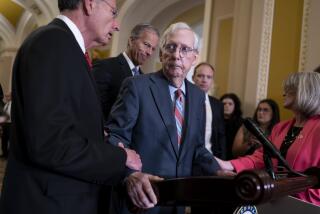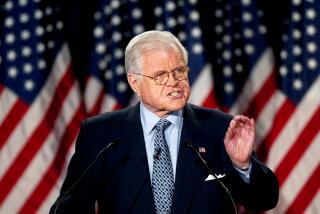The gentleman from Montana
- Share via
The first time I ever encountered Mike Mansfield, the legendary Senate majority leader and new U.S. ambassador to Japan, was at the ceremonial conclusion in Tokyo of a delicate round of U.S.-Japan trade talks in the ‘70s. As a journalist bored by the rituals of formality, I watched both sides exchange phony smiles and handshakes for cameras. Suddenly Mansfield, whom I was eager to meet, motioned to a side door. In an embassy hallway, he said without introduction or hesitancy, “Come with me.”
We entered a tiny room. There, obediently waiting, were two of the highest members of the Carter administration, officials being hunted by every reporter in Japan at that moment for a status report on the bilateral trade crisis. They were bound for the airport and Washington when Mansfield stopped them.
“This fellow you can trust,” Mansfield said, guiding me forward. “Tell him how things are going.” For 45 minutes, as their motorcade crept through Tokyo traffic, the officials followed the lower-ranked ambassador’s orders in minute detail and provided much exclusive background news for the next day’s New York Times.
This was, I later realized, classic Mike Mansfield: the savvy political veteran from Montana who, without seeming to, methodically steered the U.S. Senate through the tumultuous years of the Great Society, the Vietnam War and Watergate. Here he was now efficiently getting the Carter administration’s trade message out through his superiors without a news free-for-all, without delaying the plane and without his fingerprints anywhere on the incident. All this while earning the gratitude of his bosses and one reporter and still making it on time to a quiet dinner with Maureen, his beloved wife.
There were aspects many never saw to the humble, unassuming orphan from Big Sky Country who lived a Horatio Alger life that spanned 97% of the 20th century, ranging from orphan to hobo to Marine to copper miner to college professor to senator to presidential confidant to diplomatic emissary throughout Asia during four wars.
Sadly, we shall not see his like again. Thank goodness we have Don Oberdorfer, a veteran diplomatic correspondent who deals in facts and details, not hoopla, throughout “Senator Mansfield: The Extraordinary Life of a Great American Statesman and Diplomat.”
In a real way, Mansfield was likely the last of a historic breed of dignified statesmen who could disagree without being disrespectful because some things called duty, responsibility and nation were more important than passing partisan advantage and nine seconds on the nightly news. As difficult as genuine dignity is to imagine in public affairs today, Mansfield’s life is worth understanding as the often unsavory modern spectacles play out on Capitol Hill among a new breed of operatives in prepackaged political dramas and canned partisanship. These folks measure success less in agreements and improved American lives and more in blow-dried seconds of TV exposure, hitting their assigned speaking points like actors hitting their marks and lines onstage.
An alert 99 when he died in 2001, the Mansfield in Oberdorfer’s enlightening book was well known but rarely understood, a gaunt down-to-earth man who could be soft-spoken or unspoken, then when asked could ad-lib in private to a president a most cogent, powerful argument against prolonging the Vietnam War. Amazingly, he would not leak such effrontery to reporters. He puzzled presidents of both parties. But they listened and invited him back for more.
Mansfield was a self-effacing loner who cherished consensus, reminding some of Gary Cooper, another tall Montanan, whose “yups” and “nopes” radiated an impressive inner strength and simplicity. “I confess freely to a lack of glamor,” the senator once said. He never seemed to seek power, prestige or respect and, therefore, reaped it all the more from fellow legislators, world leaders and regular Montanans, who still call him Mike. Only one man’s statue stands in the state’s newly restored Capitol, Mike Mansfield’s. He never worked in that building.
Mansfield played quiet, behind-the-scenes, clause-by-clause roles in the legislation and diplomacy of nine presidents, from Franklin D. Roosevelt through Ronald Reagan, several times rejecting pleas to stand for vice president. Yet even in his 90s, upon unexpectedly encountering me after 14 years, he could inquire by name after an adopted daughter. “She should be going to college about now,” the senator said, puffing on his ubiquitous pipe packed with Prince Albert tobacco. “Yes, sir,” I replied, astounded. “She started last month.” The senator smiled slightly as if to confirm the father’s recollection.
Oberdorfer’s work is long and impressively detailed, much like the senator’s own chronicle in detailed daily diary entries, including luncheon menus. When the reporter initially approached Mansfield seeking cooperation for the book, the Montanan said absolutely not. On the advice of Mansfield intimates, the diligent writer continued meeting Mansfield anyway. As foreseen, the senator continued talking and talking, knowing full well about the project and, frankly, not caring.
The impressiveness of the life and book come not so much from particular details of a loyal Democrat nudging Presidents Roosevelt or Nixon or shepherding historic civil rights and education acts through a narrowly divided Senate, then allowing Republicans to garner much credit. It comes from the broader portrait of a life of diligence, determination and deft maneuverings, of the intelligence of an uneducated miner who changed his life -- and, one might argue, some history -- with the help of his adoring and sometimes demanding Maureen.
She was a schoolteacher in the world’s copper capital, Butte, Mont., a woman whose faith, encouragement and tutoring brought an unambitious miner up into high school from the nightshift in shafts a mile underground where two men died every week. Then she guided this man in his 20s through a college education and into college teaching, to repeated election to federal office and to an influential role as diplomat, both appointed and otherwise. Too bad she kept no notes.
Even in his late 90s, having dutifully sat for hours twice daily holding the hand of Maureen as she dozed and ranted to and at him from within the cell of her Alzheimer’s world, he credited her for all his success. “Without her,” he’d say, “I’d have been dead 50 years ago.”
Thank goodness for that partnership, as Oberdorfer describes it. As an underage Marine, Mansfield patrolled the streets of China during World War I before becoming a keen student of Asian affairs. His understanding, negotiating savvy and long friendships with Chinese revolutionaries like Chou En-lai helped create the historic opening between China and the United States some six decades later. Typically, Mansfield, who’d personally helped pave the way for rapprochement for years, stepped aside to allow Nixon to receive all the credit.
In the Senate it was Mansfield, seemingly so quiet and ineffective in the face of the bombast and bullying of the former majority leader, Sen. Lyndon B. Johnson (D-Texas), who developed a tacit alliance with Illinois Republican Sen. Everett M. Dirksen to ensure cloture and passage of historic civil rights legislation under then-President Johnson. “Sometimes,” Mansfield said, “the other side is right. It doesn’t do any harm to listen.”
Oberdorfer relentlessly links Mansfield with historic events he helped shape, portraying him not as one-dimensional TV caricature but as multifaceted human with values and foibles.
Mansfield began life inauspiciously in 1903 in New York, the son of an Irish immigrant construction worker and a doting mother, who died seven years later. She left her son with a lone lifetime memory: sitting in a park together with a bird flying nearby. Soon, he was shipped to Montana relatives, where his unhappiness prompted brief stints in reform school and as a hobo. By the time he went underground, though, he had traveled the world as a member of each of the three existing U.S. military services, an experience that ignited a lifelong interest in Asia and belief that America’s future lay there, not in Europe. He also learned the value of being underestimated, a strategy also favored by a certain current president.
Mansfield spent 10 years in the House and 24 years in the Senate, 16 of them as majority leader, the longest ever. After nearly 12 as ambassador, the conservative Reagan, in his last act as president, awarded the Medal of Freedom to the liberal Democrat Mansfield.
This full life ended in a Washington hospital -- one year and 14 days after his beloved wife’s -- with Mansfield refusing extraordinary measures but first asking after the weekend success of a favorite underdog football player, Doug Flutie. Maureen and Mike Mansfield are together now in Arlington National Cemetery, where his tombstone captures 99 years of life in seven words: “Michael Joseph Mansfield Pvt US Marine Corps.”
He may be gone, but his hours of private diary-writing from around the globe, tons of files from nearly half a century in government service and Oberdorfer’s diligent research and professional prose, ensure that the Montanan’s life, its example and its many lessons can quietly live on. What a legacy to savor amid all this shouting. *
More to Read
Sign up for Essential California
The most important California stories and recommendations in your inbox every morning.
You may occasionally receive promotional content from the Los Angeles Times.













